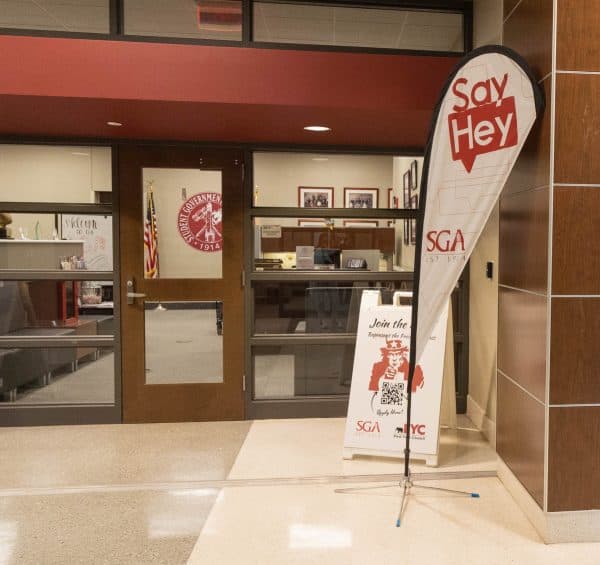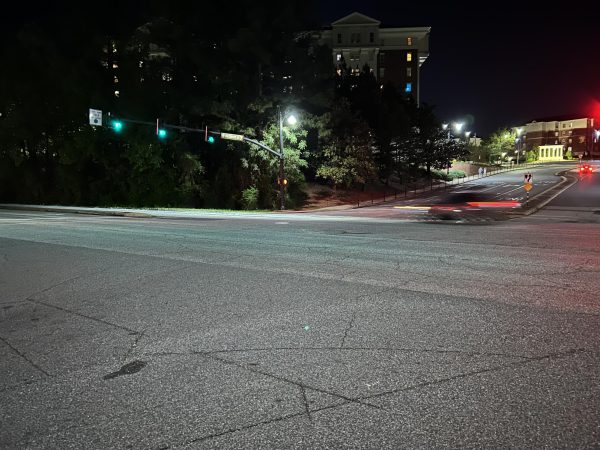Organization on campus aims to lessen abortion stigma
September 24, 2018
Dial, a senior studying marginalized identities and the law in the New College. She has been a member of Unite for Reproductive & Gender Equity (URGE) for three years.
Every year, URGE hosts an event called the Abortion Positive Tour to spread the organization’s message. URGE members walked around the Quad on Sept. 18, talking with students and offering them a chance to sign a petition.
“URGE is an organization based out of [Washington] D.C.that does work in Alabama, Georgia, Kansas, Ohio and Texas,” Dial said. “Sort of the states that need the most help in the realm of reproductive justice.”
URGE has been on campus for three years, Dial said. Before that, it was Alliance for Sexual and Reproductive Justice (ASRJ). URGE operates on a national level whereas ASRJ did not.
URGE aims to educate students on abortion and reproductive rights at the University. The organization also aims to combat the stigma surrounding abortion, said Danielle Hurd-Wilson, director of chapters and curriculum at URGE.
“We want to create a space to destigmatize abortion in general because we feel that abortion access is incredibly important for all folks,” Hurd-Wilson said. “It should be legal, safe, accessible, affordable, all of the reasons why folks can get abortions when they really need that health service.”
One of the biggest topics that members of URGE tried to educate students on is Alabama Amendment 2, the State Abortion Policy Amendment. The petition members asked students to sign was against Amendment 2, one of four statewide amendments that will appear on the ballot this November.
“The more educated that people are on the actual specific language of it, the more people are against it,” Dial said.
According to AL.com, one of Amendment 2’s functions, if it passes, would be to ensure that the state constitution would not protect the right to an abortion or public funding for them.
“I think that it’s really dangerous,” Dial said. “A lot of people we’ve talked to today that would identify as pro-life think that that’s really extreme and that kind of terrible that there is no exception.”
“We are not here to argue with people,” Hurd-Wilson said. “There are anti-choice people all over the country not just in the South. I think that there’s definitely a concentration of folks who are anti-choice. I think it’s really interesting that people, particularly on a college campus, feel so strongly when I feel like this should be a place where you really interrogate your beliefs instead of dig your heels in.”
Dial said that most people were supportive during the event and wanted to seek out this community.
“So understanding that for us, anything that threatens someone’s ability to build a life and a family that they want whether that’s financial hardship, LGBTQ discrimination, any sort of threat to their bodily autonomy, we think that those things shouldn’t be and that people should be able to make the choices they want to make while being fully informed,” Hurd-Wilson said.
However, not everyone supports URGE’s message.
“In the vast majority of situations abortion doesn’t make any sense,” said Iain Athey, a junior majoring in metallurgical engineering.
For Athey, while abortion is classified as a reproductive right, another right that humans have – according to the Constitution – is the right to life.
If the fetus is not a person, then its rights can be diminished, Athey said. He thinks if a fetus is considered human, then it should be granted full protection of the law and has all of the rights of a person.
“So the question becomes is the fetus a human person,” Athey said. “Because the answer to that question lays forth how we as a society will legally treat a fetus, either with the full array of rights granted to a human person by law, or not.”
Regardless, Athey said he is glad that URGE exists.
“Nothing much really would ever get done in life if no one got up and decided to fight for what they believe in,” Athey said.










